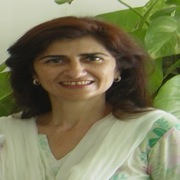Selwa Habib talks to Blue Chip about the environmentally friendly project initiated by the women workers at the R’aana Liaquat Craftsmen’s Colony
Starting with building schools Ra’ana Liaquat Craftsmen’s Colony (RLCC) has also started providing newspaper recyclable shopping bags; this is a big change. What has prompted this?
Selwa Habib: “First of all, RLCC has always been a multi-dimensional project since its inception in 1953. It has a three-pronged holistic approach on providing education, health facilities and awareness, and vocational training skills for income generation. Empowering women is our goal. Concerning vocational training, we provide programmes for home based vocation, such as, cutting and sewing, hand embroidery, etc. Career based programmes include beautician-training, computer literacy, English language, mehndi application and so on. Various other demo classes like tie and dye, bead work, weaving etc. are also conducted. Therefore, the making of newspaper bags was not a paradigm shift for us. The concept fits well into our objectives.”
Is this an income-generating project? Does it generate a profit to fund the charities associated with you?
SH: “The core emphasis is to provide a source of income to very needy and destitute woman that live in Shah Faisal Colony, Karachi, therefore income generation is its main objective. The price of the bag has to be kept at a minimum to be competitive and to bring about awareness in the population about the importance of recycling for the environment. Therefore, we charge for the material we buy, and we try to cover overheads, namely, the salaries of the quality checkers, and other staff necessary to run the programme. No profit is earned.”
Are the women working at the project earning incomes from this?
SH: “Initially, the women employed in this programme used to come to us for help with monthly rations, school fees, dowries for their daughters’ marriages and health issues. They started coming to us for work to earn a living, but they have found that it has been rewarding in many more ways.
Now that they have been working with us for about two years, they find that they are no longer in debt. Even if they can’t afford to buy their rations in a particular month, they aren’t embarrassed to ask for loans, as they are able to repay them. At one time they used to have to hide from their husbands or fathers to come to work, now they have respect in their families, as they have become earning members supporting their families. They are able to put money aside for their daughters’ dowries and children’s education. Young girls have started paying for advancing their education or skills. The most rewarding result for a lot of the women has been the respect they now get at home to the extent that husbands have started helping them with housework!”
There is a criticism that the women could instead have been given vocational training in a skill or craft. What do you have to say about this?
SH: “As I have already mentioned, RLCC has a Vocational Training Centre for women from the start. These trainings have been enhanced with income generation skills for women with neither skills nor education, but with a need for immediate earning capability. Women that have a skill like embroidery or crochet or even sewing, we try to improve the quality of their product, then modernize the craft and sell for them.”
What are your long-term goals for this project?
SH: “Our long-term goals are: primarily to enhance our current infrastructure and outreach. First, by building a purpose built primary school, next to add a floor to the Vocational Training Centre and then adding consulting clinics to our Community Health Centre. The aim in the future is to replicate the blueprint of RLCC all over the city. Many such projects are operating in Pakistan but we have managed to work in partnership with various NGOs and this we feel is a strength as there are people specializing in certain fields, so instead of reinventing the wheel, we tie up with them to run their programme with us.”
Where did the idea come from?
SH: “About two years ago, my friend and colleague Farhaneh Khaleeli, was holidaying in England. Shopping in an up market area in Wimbledon, she received a newspaper bag made by street children in India. We were inspired by this and decided to try to make it work in Pakistan. Then we found out that Bangladesh has managed to practically eradicate plastic. We hate the disgusting sight of plastic bags hanging from trees, polluting our beaches and the streets, not to mention what plastic does to our sewerage lines and storm drains, causing flooding during the monsoons. We thought we would try to improve our environment as well as provide an income generating opportunity to the destitute of Shah Faisal Town.”
Where are you getting your newspapers from?
SH: “Certain business like banks and advertising organizations, also friends and family have been supplying us with paper till now, but now that we’re getting bigger orders, we have started newspaper drives in schools as well. This has had a dual effect: environmental consciousness and donations. Bay View Academy and CAS have already completed their drives next KGS, Frobel and KAS will be starting theirs.”
You are currently providing 100,000 bags. Do you have orders for more?
SH: “Currently we supplying around 20,000 bags per month, Inshallah we hope to take the quantities to 100,000.”






